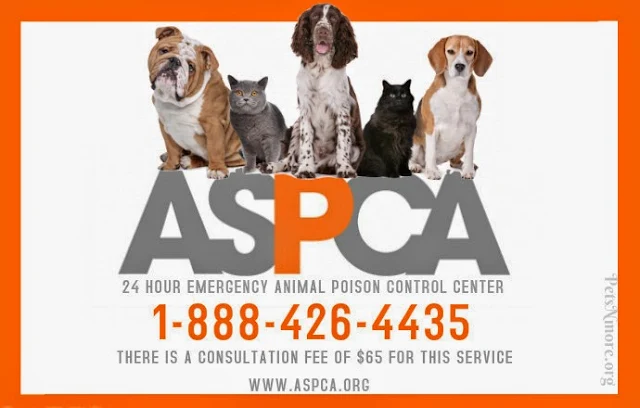Last year the ASPCA Animal Poison Control Center (APCC) in Urbana, Illinois, handled nearly 180,000 cases about pets exposed to possibly poisonous substances. And the APCC is only one of several pet poison resource across the U.S.
What To Do If You Think Your Pet Has Been Poisoned
Be Ready: Before you ever need them, make sure your veterinarian’s phone number, the number of the closest emergency veterinary hospital, and the number for a pet poison center are saved in your phone.
Don't Panic
Rapid response is important, but panicking can interfere with the process of helping your pet.Don't Panic
Take 30 to 60 seconds to safely collect and have at hand any material involved. This may be of great benefit to your vet as they determine what poison or poisons are involved.
In the event that you need to take your pet to a local veterinarian, be sure to take the product's container with you. Also, collect in a sealable plastic bag any material your pet may have vomited or chewed.
If you know or suspect your pet has ingested a poison, don’t wait for symptoms before seeking help. Time is of the essence in preventing the poison from being absorbed by your pet’s body.
A joint service provided by North Shore Animal League America (NSAL) and PROSAR International Animal Poison Center (IAPC). 1-888-232-8870 ($35.00 per incident).
The charge is billed to caller's credit card only. Staffed 24-hours a day, 7 days a week.
The following is another helpline if you need it:
RELATED:
Be Proactive
If you know or suspect your pet has ingested a poison, don’t wait for symptoms before seeking help. Time is of the essence in preventing the poison from being absorbed by your pet’s body.
The faster you are able to treat your furry companion at home (with guidance from your vet or a pet poison hotline), or get her to a veterinarian, the better her chances for survival and a full recovery.
If you witness your pet consuming material that you suspect might be toxic, do not hesitate to seek emergency assistance, even if you do not notice any adverse effects.
Sometimes, even if poisoned, an animal may appear normal for several hours or for days after the incident.
- The species, breed, age, sex, weight and number of animals involved.
- The animal's symptoms.
- Information regarding the exposure, including the agent (if known), the amount of the agent involved and the time elapsed since the time of exposure.
- Have the product container/packaging available for reference.
 |
| $49 Per Incident Fee Click here to find a particular pet poison with detailed information |
 |
| Click Here to visit their site |
ASPCA National Animal Poison Control Center
- 1-900-443-0000 ($60.00 per case). The charge is billed directly to the caller's phone.
- 1-888-4ANI-HELP or 1-888-426-4435 ($60.00 per case). The charge is billed to caller's credit card only.
Animal Poison Hotline
The charge is billed to caller's credit card only. Staffed 24-hours a day, 7 days a week.
The following is another helpline if you need it:
24/7 Animal Poison Control Center
855-764-7661
Toll free number (800-858-7378)
Fax number (541-737-0761)
E-Mail: nptn@ace.orst.edu
Web site: nptn.orst.edu
Fax number (541-737-0761)
E-Mail: nptn@ace.orst.edu
Web site: nptn.orst.edu
To find the human poison control center nearest you go to:
American Association of
Poison Control Centers
Poison Control Centers




